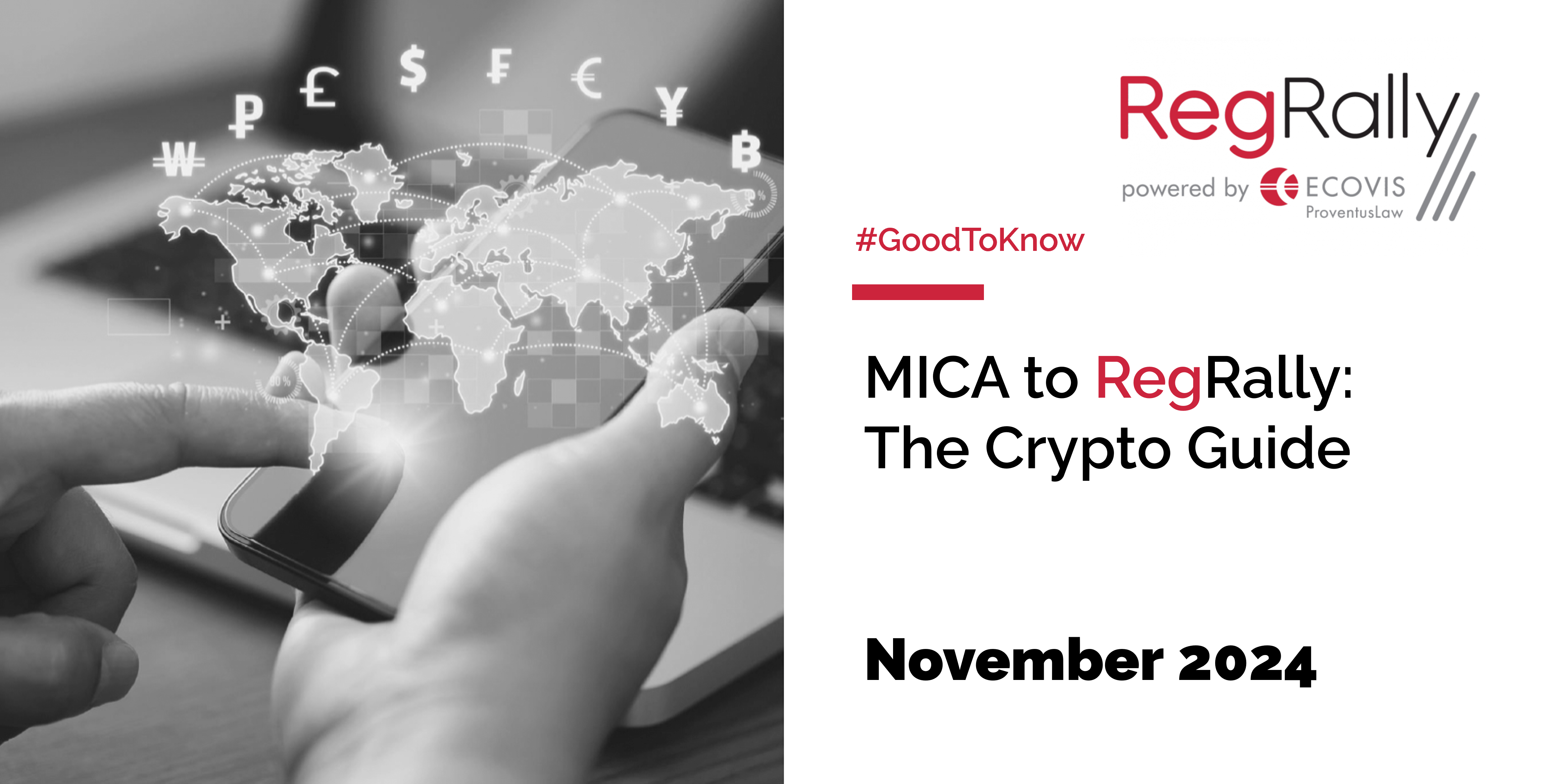ECOVIS ProventusLaw brings you a curated selection of significant developments from the European and global crypto regulatory landscape in November 2024.
EUROPE
ECB calls for digital revolution in capital markets
The European Central Bank (ECB) calls for a coordinated approach to digital assets and distributed ledger technology (DLT) as part of a broader effort to establish a “digital capital markets union” for Europe. Read more.
ECB paper claims older Bitcoin holders are exploiting new holders
A recent paper published by the European Central Bank, claimed that older Bitcoin holders profit at the expense of newer holders and argued that the scarce decentralized currency should be regulated to prevent its price from rising or outright banned.
European blockchain sandbox onboards 41 regulators in second cohort
The European Blockchain Sandbox Initiative expands with 41 regulators and authorities from 22 countries, boosting blockchain innovation and regulatory collaboration. The European Commission has announced the regulators are participating in the second cohort of its blockchain sandbox initiative. Read more.
Bank of England and FCA launch Digital Securities Sandbox
The regulatory sandbox aims to strengthen the United Kingdom’s position as a global financial hub. The Bank of England (BoE) and the United Kingdom’s financial regulator have launched a sandbox to explore how digital ledger technology (DLT) can be used in the notary, maintenance and settlement of financial securities. Read more.
Kraken to end Monero support in European Economic Area
Crypto exchange Kraken will end its support for privacy token Monero in the European Economic Area (EEA). Monero’s price fell by 8% a day after Kraken announced it would stop supporting the privacy-focused crypto-asset. Read more.
G7 antitrust watchdogs signal possible action on AI sector competition
G7 nations’ antitrust authorities signaled they may take “vigorous” enforcement action to protect competition in the artificial intelligence sector by tackling risks before they become “entrenched or irreversible.” Read more.
Internet consultation for legislative proposal on reporting obligation for crypto providers | Government of the Netherlands
A new bill requires crypto service providers to collect, verify, and share user data with the Tax and Customs Administration starting January 1, 2026, aiming to enhance transparency in crypto ownership and reduce tax evasion. However, there will be no changes for crypto owners, as they already must declare their crypto holdings.
Report on crypto-financial assets
The Tax Law Council suggests that gains and losses from trading financial crypto-assets should be taxed under the same regulations as financial contracts related to stocks, as outlined in the Capital Gains Act. This change aims to ensure more appropriate taxation for investors dealing in crypto-assets.
Cyprus freezes crypto applications ahead of EU-wide MiCA transition
The European Union will transition from national laws on crypto asset service providers (CASPs) to common Markets in Crypto-Assets (MiCA) regulations by December 30. The Cyprus Securities and Exchange Commission (CySEC) is providing an example of that transition as it freezes CASP applications and warns market participants of changes to come.
CySEC is no longer accepting new applications for crypto-asset service providers
The Cyprus Securities and Exchange Commission (CySEC) has announced that from 17 October onwards, applications to register Crypto-Asset Service Providers (CASPs) will no longer be accepted in view of the implementation of the Regulation (EU) 2023/1114 for Markets in Crypto-Assets on 30 December 2024. Read more.
GLOBAL
The World Economic Forum (WEF) recommended using regulatory sandboxes to foster decentralized finance innovation while mitigating risks
The WEF urged policymakers and regulators worldwide to conduct decentralized finance (DeFi)-related innovations and experiments within regulatory sandboxes, focusing on tailored risk mitigation and transparency.
UN Agency Recommends Criminalization of Unlicensed VASPs in Southeast Asia to Counter Cyber Fraud
The UNODC has released a set of recommendations for combating cyber-enabled fraud in Southeast Asia. It also warned scammers are diversifying into new tactics and making use of new technologies such as AI.
FSB Report Highlights Future Risks of Tokenization Despite Low Current Impact
The Financial Stability Board (FSB) released a report on October 22 examining the risks and opportunities of tokenization in traditional finance. According to the report, the FSB found that while current risks remain minimal, they could grow with wider adoption.
Project Mandala: shaping the future of cross-border payments compliance
Project Mandala aims to integrate jurisdiction-specific policy requirements into a common protocol to simplify cross-border payments, reducing regulatory burdens and transaction times. Led by BISIH Singapore Centre and central banks from Australia, Korea, Malaysia, and Singapore, it automates compliance and enhances real-time monitoring and transparency. This initiative builds on Project Dunbar and aligns with the Financial Stability Board’s 2023 goals to create a more efficient and secure regulatory environment for global payments.
Researchers hack AI-enabled robots to cause ‘real world’ harm
Penn Engineering researchers published their findings, detailing how their algorithm, RoboPAIR, achieved a 100% jailbreak rate by bypassing the safety protocols on three different AI robotic systems.


 Newsletter Subscription
Newsletter Subscription